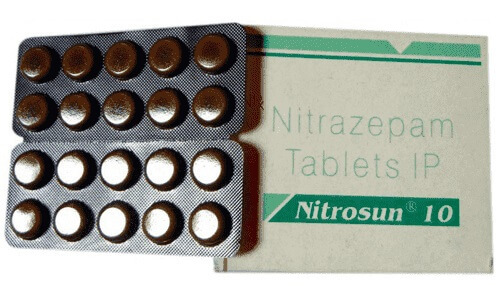

What Nitrosun (nitrazepam) tablets are and what they are used for?
Nitrosun (nitrazepam) belongs to a class of drugs called
benzodiazepines that are known for their sedative properties. Nitrosun
(nitrazepam) is a powerful hypnotic drug that causes sedation, relieve anxiety,
amnesia and convulsions and also relax skeletal muscles. It shortens the time
required to fall asleep and lengthens the duration of sleep. This medicine is
only recommended in adults and elderly for short term treatment of severe
sleeplessness (insomnia) that also causes distress.
Do not take
Nitrazepam tablets if you:
·
are allergic to nitrazepam
·
are allergic to any drug
belongs to benzodiazepines class
·
have severe breathing problem
or chest problem
·
suffering from acute porphyria
·
suffering from myasthenia gravis
·
suffering from sleep apnoea
syndrome (difficulty in breathing during sleep)
·
suffering from any mental
illness or personality disorder (phobia or obsession)
Nitrazepam is a benzodiazepine compound having sedative
properties. It shortens the time required to fall asleep and lengthens the
duration of sleep. It acts in 30 to 60 minutes to produce sleep lasting up to 6
to 8 hours.
Always take this medicine following the instructions of your doctor
or pharmacist.
Treatment should be for a short duration of time and
must be started with the lowest effective dose. The maximum dose should not be
exceeded. Generally, the duration of treatment varies from a few days to two
weeks, with a maximum of four weeks; including the tapering off process
(gradually reducing the dose before ending the treatment). Dosage should be
adjusted on an individual basis. If possible, the treatment should be on an
intermittent basis. Long-term chronic use of this medicine is not recommended.
Adults: 5 mg before rsleep. This dose may be increased for up to 10 mg. Do
not give this medicine to the children under 12 years of age.
Method of administration: For oral administration only.
Take the
medicine just before going to bed and making sure you can sleep for 7-8 hours
without being disturbed after taking the tablets.
Swallow
the whole tablet with water or with some other non-alcoholic drink, without
crushing or chewing the tablet.
If you take too many tablets or someone else
accidentally takes your medicine, contact your doctor, pharmacist immediately
or go to the nearest hospital straight away.
If you forget to take your scheduled dose, you should
never make up for the missing dose by doubling the dose next time. Instead,
simply continue with the single next dose at the right time.
If you abruptly stop taking Nitrazepam tablet withdrawal
symptoms like headache, depression, confusion, mood changes, nervousness,
irritability, extreme anxiety, restlessness etc. may occur as this medicine causes
dependence. Therefore, stop using medicine as per instructions of your doctor
who will advise to discontinue the medicine by following dose tapering
technique.
Please remember that nitrazepam is not suitable for
long-term use. The beneficial effects of nitrazepam decrease as tolerance
develops with its long-term use and it can also cause dependency. Therefore,
you should always follow the dosing instructions advised by your doctor to
ensure that long-term use is avoided.
Nitrosun (nitrazepam) tablets should not be used alone
to treat depression or anxiety, since this medicine exaggerate suicidal
thoughts in patients suffering with depression.
In patients with chronic pulmonary insufficiency and in
patients with chronic kidney or liver disease, a dose reduction is required
usually half of the usual adult dose. Benzodiazepines are contraindicated in
patients with severe hepatic insufficiency.
If you are
breast feeding mother do not take this medicine as this medicine excrete in
breast milk.
If you are planning pregnancy then you must consider
withdrawal effects of this medicine as it causes dependency.
The use Nitrosun (nitrazepam) causes sedation, amnesia,
impaired concentration and impaired muscular function that can adversely affect
the ability to drive or to use machinery. This medicine can also impair your
cognitive function and thus caution is required while drive or avoid driving.
·
Allergic reaction/
hypersensitivity: swelling of face, lips, tongue or throat or difficulty in
breathing or swallowing may also be experienced.
·
Skin rash, itching, red colored
irregular raised patches on skin are also observed.
· Dizziness, drowsiness, feeling numb, feeling tired etc.
If you experience any of the above symptoms, stop using the medicine
and immediately seek advice of your doctor.
Store this medicine at room temperature below 25oC and
protect from light. Keep this medicine out of reach and sight of children.
Do not use this medicine after the expiry date mentioned on the pack and blister strip.
1 ) https://www.medicines.org.uk/emc/product/5893/smpc#gref

You cannot cancel the order and demand refund once the order is successfully placed and processed by the payment gateway. Refund requests will only be considered in the following cases:
1)If the shipping location is not serviced by our partner courier companies. Damaged products will be exchanged as per our exchange policy. From the date of written confirmation of refund to the customer, the amount will be refunded within the next 7-10 business days. The amount will be refunded in the customer's mode of payment.
2)From the date of written confirmation of refund to the customer, the amount will be refunded within the next 7-10 business days. The amount will be refunded in the customer's mode of payment.